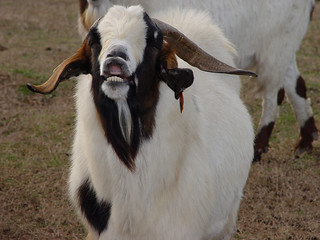Time for sheep, goat producers to prepare for breeding season
September 12, 2014
(407 words)
PINE BLUFF, Ark. – Breeding season for sheep and goats is looming, and several steps should be taken now to ensure a successful season, said Dr. David Fernandez, Cooperative Extension Program livestock specialist at the University of Arkansas at Pine Bluff.
Breeders should be concerned about body condition and nutritional status, parasite control, breeding soundness, flushing and preparing for winter feed needs.
Body condition and nutritional status are among the keys to successful reproduction, he said.
Females should be in moderate body condition. Those that are too fat or too thin are not as fertile and are less likely to produce twins. Fact sheet FSA 9610 “Body Condition Scoring of Sheep” is available online at http://www.uaex.uada.edu/publications/PDF/FSA-9610.pdf. The same method also works for goats.
Parasite control is another important factor. A heavy infestation of barber pole worms can weaken ewes and does and impair reproduction. Instead of deworming your entire flock or herd, only deworm those that really need it, Fernandez said. Use the FAMACHA score or fecal egg counts to determine which animals should be treated. FSA 9608 “Fecal Egg Counting for Sheep and Goat Producers” (http://www.uaex.uada.edu/publications/PDF/FSA-9608.pdf) can help determine your animals’ parasite loads.
Conduct breeding soundness exams yearly on bucks and rams to see if they are still fertile. If they are not, an entire lamb or kid crop can be lost. Finding a veterinarian who can conduct the test for you is difficult, but if more veterinarians know producers want that service, more will offer it, he said.
Flushing is the practice of providing extra nutrition to ewes or does for 10 -14 days before the beginning of the breeding season. The extra nutrition helps females in moderately poor body condition breed successfully and may help increase their twinning rate, Fernandez said. Animals already in good condition do not benefit from flushing. FSA 9611 “Feeding Ewes to Maximize Reproductive Success” (http://www.uaex.uada.edu/publications/PDF/FSA-9611.pdf) provides information on nutritional management of ewes and does for optimum reproduction.
Begin preparing for winter feeding. Plant cool season annuals to provide the best possible nutrition in the early spring when ewes and does will be giving birth and their nutritional needs will be greatest. Most of the time, cool season annuals reduce feeding costs and provide better nutrition than hay. Test your hay to be sure it meets or exceeds your ewes’ and does’ late pregnancy nutrition requirements. Be careful to avoid overfeeding because fat ewes and does can suffer from pregnancy toxemia.
For answers to livestock questions, contact Fernandez at (870) 575-7214 or email fernandezd@uapb.edu.
Pursuant to 7 CFR § 15.3, the University of Arkansas System Division of Agriculture offers all its Extension and Research programs and services (including employment) without regard to race, color, sex, national origin, religion, age, disability, marital or veteran status, genetic information, sexual preference, pregnancy or any other legally protected status, and is an equal opportunity institution.
By Carol Sanders, writer/editor
UAPB School of Agriculture, Fisheries and Human Sciences
(870) 575-7238
sandersc@uapb.edu
Related Links
